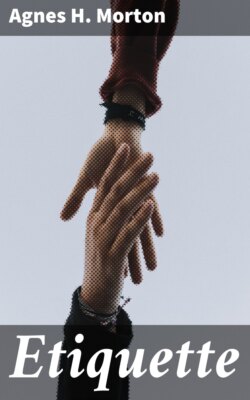Читать книгу Etiquette - Agnes H. Morton - Страница 4
На сайте Литреса книга снята с продажи.
III. CEREMONIOUS CARDS AND INVITATIONS. ETIQUETTE OF REPLIES. THE "HIGH TEA," OR MUSICALE, ETC. WEDDING INVITATIONS. DINNER INVITATIONS. LUNCHEON AND BREAKFAST INVITATIONS. IV. THE CONDUCT OF A CHURCH WEDDING V. ENTERTAINING VI. AFTERNOON RECEPTIONS AND TEAS VII. THE DINNER SERVICE REQUISITES FOR THE DINING-TABLE. THE FORMAL ARRANGEMENT OF THE DINNER-TABLE. THE ARRIVAL OF GUESTS, MEANWHILE. THE ANNOUNCEMENT OF DINNER. THE SERVING OF THE DINNER. MISCELLANEOUS POINTS. DINNER-TABLE TALK. INFORMAL DINNERS. VIII. LUNCHEONS IX. SUPPERS X. BREAKFASTS XI. EVENING PARTIES XII. THE TWENTIETH CENTURY XIII. "THE STRANGER THAT IS WITHIN THY GATES" XIV. "MAKE YOURSELF AT HOME" XV. "AS THE TWIG IS BENT" XVI. SOCIAL YOUNG AMERICA XVII. THE AMERICAN CHAPERONE XVIII. GREETINGS. RECOGNITIONS. INTRODUCTIONS XIX. BEHAVIOR IN PUBLIC THOROUGHFARES XX. IN PUBLIC ASSEMBLIES XXI. BEARING AND SPEECH XXII. SELF-COMMAND XXIII. A FEW POINTS ON DRESS XXIV. PERSONAL HABITS XXV. SOCIAL CO-OPERATION XXVI. ON THE WING XXVII. ETIQUETTE OF GIFTS XXVIII. GALLANTRY AND COQUETRY XXIX. IN CONCLUSION INTRODUCTION
ОглавлениеTable of Contents
As a rule, books of etiquette are written from the standpoint of the ultra-fashionable circle. They give large space to the details of behavior on occasions of extreme conventionality, and describe minutely the conduct proper on state occasions. But the majority in every town and village are people of moderate means and quiet habits of living, to whom the extreme formalities of the world of fashion will always remain something of an abstraction, and the knowledge of them is not of much practical use except to the few who are reflective enough to infer their own particular rule from any illustration of the general code.
Though it is interesting as a matter of information to know how a state dinner is conducted, still, as a matter of fact, the dinners usually given within this broad zone of "the average" are served without the assistance of butler, footman, or florist; innocent of wines and minus the more elaborate and expensive courses; and though served à la Russe the service is under the watchful supervision of the hostess herself and executed by the more or less skillful hand of a demure maid-servant. Yet, in all essential points, the laws of etiquette controlling the conduct of this simple dinner of the American democrat are the same as those observed in the ceremonious banquet of the ambitious aristocrat. The degree of formality varies; the quality of courtesy is unchanging.
Well-mannered people are those who are at all times thoughtfully observant of little proprieties Such people do not "forget their manners" when away from home. They eat at the hotel table as daintily and with as polite regard for the comfort of their nearest neighbor as though they were among critical acquaintances. They never elbow mercilessly through crowded theatre aisles, nor stand up in front of others to see the pictures of a panorama, nor allow their children to climb upon the car seats with muddy or rough-nailed shoes; nor do a score of other things that every day are to be observed in public places, the mortifying tell-tale marks of an habitual ill-manners.
The importance of constant attention to points of etiquette cannot be too earnestly emphasized. The long lecture of instruction to the little Ruggles', preparatory to their visit to the Birds, is a comical—if burlesque—illustration of the emergency that sometimes faces some people, that of suddenly preparing to "behave themselves" on a great occasion. Although the little Ruggles' were fired with ambition to do themselves credit, their crude preparation was not equal to the occasion. The best of intentions could not at once take the place of established custom. One might as well hastily wrap himself in a yard or two of uncut broadcloth expecting it to be transformed, by instant miracle, into a coat. The garment must be cut and fitted, and adjusted and worn for a space of time before it can become the well-fitting habit, worn with the easy grace of unconsciousness which marks the habitually well-mannered.
In this brief volume I have endeavored to suggest some of the fundamental laws of good behavior in every-day life. It is hoped that the conclusions reached, while not claiming to be either exhaustive or infallible, may be useful as far as they go. Where authorities differ as to forms I have stated the rule which has the most widespread sanction of good usage.
